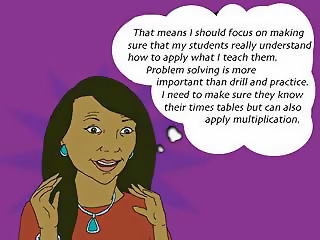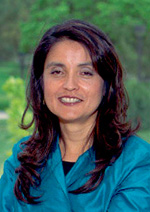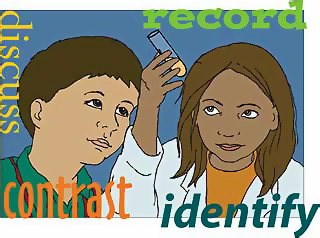How will Ms. Begay know she is teaching her students everything they need to learn this year?
Page 1: Standards
There are two types of standards: content and performance (achievement). Content standards create a clear outline of the essential knowledge, skills, and understanding that students need to master in a given content area. Content standards refer to what gets taught in specific content areas (e.g., reading, language arts, mathematics, science, history). They define the breadth and depth of knowledge, skills, and processes that are to be taught within a given domain. Because states and school districts are striving to increase student performance, educational professionals and other stakeholders in the community include challenging and rigorous content in the development of standards.
All states have developed content standards in at least the areas of reading/ language arts, math, and science. Most states have developed content standards in other areas as well, including art, health, technology, and career education. However, only the academic areas are assessed using large-scale tests.
 The National Council of Teachers of Mathematics (NCTM) and the National Academies have published two influential standards documents that serve as the basis for establishing national standards. These educational standards emphasize both specific knowledge and skills, while also addressing how the knowledge should be used through problem solving and real-life applications. The standards stress the application of knowledge and not just rote learning or the memorization of facts. This results in more “active roles for students, less teacher-directed instruction, less rote skills development, and more emphasis on students’ understanding of topics and how to link math and science than simply learning content.”
The National Council of Teachers of Mathematics (NCTM) and the National Academies have published two influential standards documents that serve as the basis for establishing national standards. These educational standards emphasize both specific knowledge and skills, while also addressing how the knowledge should be used through problem solving and real-life applications. The standards stress the application of knowledge and not just rote learning or the memorization of facts. This results in more “active roles for students, less teacher-directed instruction, less rote skills development, and more emphasis on students’ understanding of topics and how to link math and science than simply learning content.”
Listen as Diane Torres-Velásquez talks about children being active participants in their learning (time: 1:15).

Diane Torres-Velásquez, PhD
Associate Professor, Special Education Department
University of New Mexico
Transcript: Diane Torres-Velásquez, PhD
Mathematics is really looking at the world around us and making sense of it. And so, as we’re looking at this type of perception of mathematics, then it’s really important for us to understand that it’s much more than just learning to add and subtract and multiply and divide just by learning the steps. We’re looking at mathematics in a way that involves children at a much deeper level and where children are participating. They’re active participants in their learning and their experience of mathematics, and so when we look at the verbs as we’re planning mathematics instruction, when we’re looking at the verbs of what it is to do mathematics, we are looking at words like explore, solve, justify, develop, words that are action words and not just the directional words that we use to associate with arithmetic. So mathematics, when we look at the standards, the five goals that were set forth by the NCTM standards, were to first of all to learn to value mathematics, to become confident in ability to do mathematics, to become mathematical problem solvers, to learn to communicate mathematics, and to reason mathematically.
Performance Standards
 Performance or achievement standards refer to the level of mastery of the content that the student is expected to attain. These performance standards translate content into explicit information and proficiency levels that students are expected to demonstrate. In other words, a school system adopts standards for content areas that identify the performance outcomes that students are expected to attain. Teachers must be aware of the specific standards in order to develop congruent instructional programs. Educational goals should be written according to grade level and provide a measure that students are expected to reach each academic school year.
Performance or achievement standards refer to the level of mastery of the content that the student is expected to attain. These performance standards translate content into explicit information and proficiency levels that students are expected to demonstrate. In other words, a school system adopts standards for content areas that identify the performance outcomes that students are expected to attain. Teachers must be aware of the specific standards in order to develop congruent instructional programs. Educational goals should be written according to grade level and provide a measure that students are expected to reach each academic school year.
Next, state (and district-level) assessments are used to measure student achievement of the content standards. Today’s assessments also measure the application of knowledge and skills and guide how teachers should teach the content. School personnel must be able to identify when student performance meets the standards and when it does not. School personnel can analyze the performance results of individual classrooms in order to identify teachers who need to adapt their instructional methods of teaching.